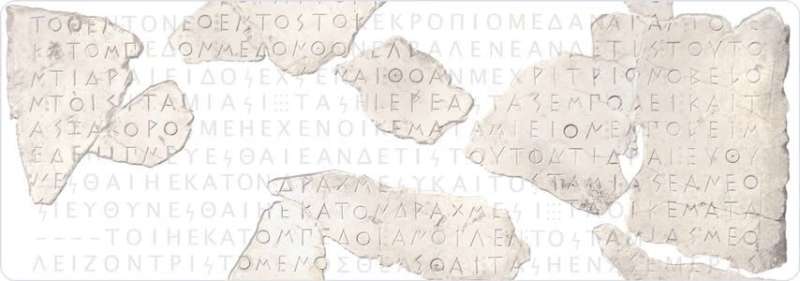Using AI to fill in the missing gaps in ancient texts

A team of AI researchers at DeepMind, working with colleagues from the University of Venice, the University of Oxford and Athens University of Economics and Business, has developed an artificial intelligence (AI) application to help historians fill in the gaps of text missing from stone, metal or pottery artifacts. In their paper published in the journal Nature, the group describes how they built the app, how it can be used and how well it worked when tested against known texts. Charlotte Roueché, with King’s College London, has published a News and Views piece in the same journal issue outlining the history of using new technology to better understand historical artifacts and the work done by the team on this new effort.
During certain points in history, humans began using written text for purposes such as keeping accounts. Such accounts can give modern scholars clues as to how people in ancient societies went about their days. But that is only if the artifacts can be deciphered. Many have been eroded by weather or have been broken and are missing pieces. Modern scholars use a variety of tools to determine the content of the original text. This is almost always a long and tedious process. In this new effort, the team at DeepMind set out to develop a tool to help in such endeavors. The result was Ithaca, a machine-learning application that learns from other ancient texts to predict missing text.
The researchers trained the application using 60,000 Greek texts from the years 700BC to 500AD. Each had already been extensively studied and reconstructed when necessary. The team then ran the app on the same texts prior to reconstruction. They then trained the app on another 8,000 well-studied texts to test it against the work done by human experts. The researchers found the system to be 62% accurate, which was better than the performance of historians. But the best results came from collaborations between the AI system and the historians; together, they were able to achieve 72% accuracy.
The researchers also added another feature—the ability to attribute a text to a time and place using clues found in the text and from other sources. They found the system to be 71% accurate in determining the origin of the writer and could place the date of writing to within 30 years, on average.
Deep learning enlightens scholars puzzling over ancient texts
Yannis Assael et al, Restoring and attributing ancient texts using deep neural networks, Nature (2022). DOI: 10.1038/s41586-022-04448-z
Charlotte Roueché, AI minds the gap and fills in missing Greek inscriptions, Nature (2022). DOI: 10.1038/d41586-022-00641-2
DeepMind blog: deepmind.com/blog/article/Pred … the-past-with-Ithaca
© 2022 Science X Network
Citation:
Using AI to fill in the missing gaps in ancient texts (2022, March 10)
retrieved 10 March 2022
from https://techxplore.com/news/2022-03-ai-gaps-ancient-texts.html
This document is subject to copyright. Apart from any fair dealing for the purpose of private study or research, no
part may be reproduced without the written permission. The content is provided for information purposes only.
For all the latest Technology News Click Here
For the latest news and updates, follow us on Google News.

